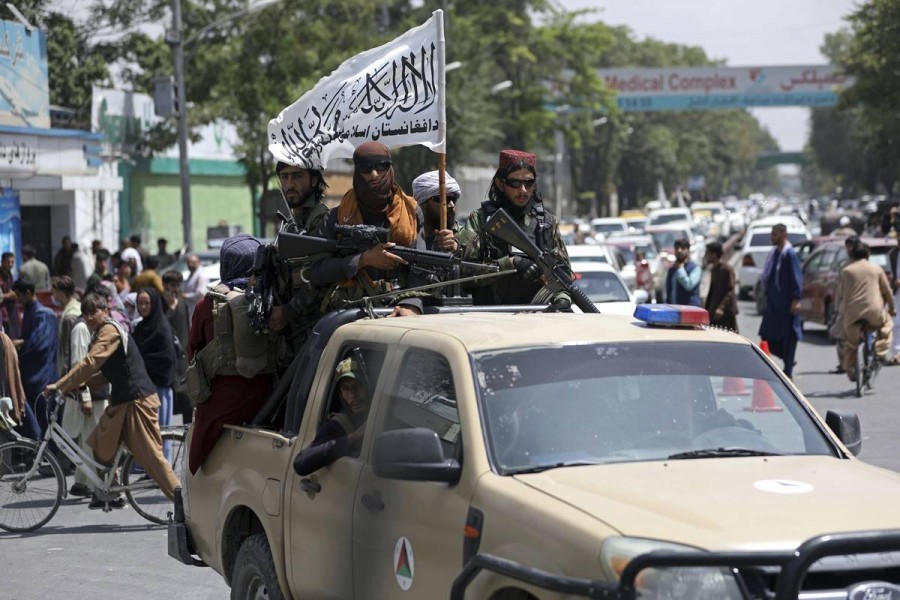
Published :
Updated :

The protagonists of regional battles prior to the two World Wars couldn't have perhaps thought even remotely of extermination of the intellectuals of the defeated countries. They would follow a semblance ethical standard in the conflicts. The overrun countries' intellectuals had also had no feeling of dread. In cases they even disapproved of the invasions. The intellectuals are the people's enemies to the Taliban --- to both the earlier and the new-generation forces promoting chronic hatred for liberal thinkers. Immediately after its 1971 liberation, the newly independent Bangladesh had to pass through a carnage of many of its great sons. By nature more savage than that of many other countries, the intellectual killings in Bangladesh occurred just days before the country's freedom. The occupation army's objective was to cripple the new nation of Bangladesh intellectually.
Both the earlier and neo-Taliban forces are ideologically opposed to freedom of thought. It is similar to their nearly misogynist attitude towards their women. They do not kill their adult women. But restrict their movement outside without being fully covered in veils and outer covers. Those who defy the regime's decree have to face severe punishments like open beatings by the 'religious police'. Education of girls crossing their teenage years is completely banned.
The World War-I saw the start of the persecution of minority population in the conquered regions. They invariably included people with intellect. The Nazis of Hitler repeated the similar episode. The Jewish intellectuals tried to go into hiding in the European countries far from Germany and the Nazi-occupied Poland. They considered those territories safe. But except a few, almost all intellectuals, scientists, painters and artistes took shelter in distant countries like the USA. Coming to the trouble-torn Afghanistan created by Soviet and US invasions, lots of intellectuals do not want to leave their motherland. It's true, hundreds and thousands continue to throng the Kabul Airport despite the deadly bomb explosions. Yet many prefer to live inside Afghanistan. Intellectuals, academics, writers and performing artistes comprise a large segment of them. They know this time they may not be spared the bullets of the Taliban zealots. But they aren't going to desert their motherland, come what may.
The previous Taliban regime banned all kinds of entertainment in Afghanistan. It was only in the later period of their rule they had lifted ban on cricket. Putting aside what the Taliban have in their mind for the future, they apparently won't soften their stance on the intellectual, creative and secular academic activities, at least for now. The scenario is different from the Nazi Germany. When it came to purges of the Jewish 'spectres', the countdown to the overrunning of Germany by Nazi fanaticism smacked of the prelude to the 1939-`45 reign of terror let loose on German intelligentsia. The beginning was an event of 'book burning' surpervised by Hitler's chief propagandist Joseph Goebbles. The writers, scientists and doctors whose books were burnt at a largely attended public event included some of the best minds of the modern Germany. Beginning with playwright Brecht, Albert Einstein, Sigmund Freud, they tried completing the list with Thomas Mann and Eric Maria Remarque. At the Berlin book burning 'festival', Goebbles delivered a provocative speech blaming the books and their authors for upholding un-German spirit. He unhesitatingly called the books and their authors 'debris of the past'.
The abhorrent event sparked widespread condemnation and disdain in the US and many European pacifist countries. Meanwhile in the Nazi-occupied France, the Paris-based writers under the banner of the Resistance Movement took up their fiery pens as arms to fight against the occupation forces. Jean Paul Sartre and Albert Camus led the underground anti-Nazi campaign.
Unfortunately, due to their being of Eastern origin the persecuted Afghan intelligentsia including writers couldn't muster the courage of waging underground movements against their Taliban rulers. Maybe, an episode of going through brutal ordeals awaits the Afghan intellectuals this time, too. The UN Human Rights chief said on August 24 that she had received credible reports of serious violations committed by the Taliban in Afghanistan. Those include 'summary executions' of civilians. Perhaps the killing of poet and historian Abdullah Atefi on August 4 and that of popular comedian Fazal Mohammad on July 28 were the work of this summary execution group. In a statement, Pen America claimed the killings of two of their members at the hands of the neo-Taliban. Twenty-two organisations and 354 writers from across the world on August 25 in an open letter urged the international community to come up to save the besieged Afghan writers and other creative people. A similar appeal came from the Afghan woman film director Sahra Karimi. In another online appeal Khaled Hossaini, the Afghan-American story-writer of the globally acclaimed movie 'The Kite Runner', narrated the plight of the 'listed' Afghan writers and intelligentsia now bracing for being gunned down by 'death squads' any time.
Against the present terrifying backdrop, Taliban government spokesmen lately assured the intellectuals, authors and artists of extending necessary cooperation to them in the pursuit of their different ventures. They added the Taliban would not hinder the activities of journalists, writers, film directors and others. The Taliban assurances, apparently, sound optimistic. The question is to what extent the intellect-based social segments could place trust in these promises. Their past experience tells a different tale.
shihabskr@ymail.com


 For all latest news, follow The Financial Express Google News channel.
For all latest news, follow The Financial Express Google News channel.